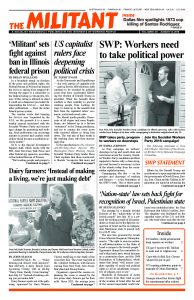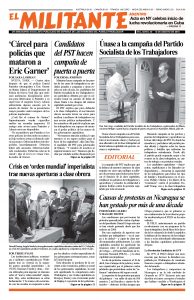The passage by a sharply divided Knesset of the “nation-state of the Jewish people” law July 19 is a setback for working people of all nationalities in Israel and to the fight for recognition of Israel and for an independent Palestinian state. It passed only by a 62-55 vote.
The new law, promoted by Israeli Prime Minister Benjamin Netanyahu, asserts, “The right to exercise national self-determination in the State of Israel is unique to the Jewish people.” Opponents charge this contradicts Israel’s other basic laws, which function as a constitution there, and the 1948 Declaration of Independence, which states that Israel “will ensure complete equality of social and political rights to all its inhabitants irrespective of religion, race or sex.”
Hundreds of thousands of Arabs were driven from their land as part of the creation of Israel after the end of the second imperialist world war. Israel was established after the Nazi Holocaust that killed 6 million Jews. The slaughter was facilitated by the capitalist rulers of the U.S. and Britain, who both before and after the war refused to admit Jews trying to flee to their shores.
Those Arabs who remained within the borders of the new state have been able to use these guarantees and the independence declaration to combat discrimination in jobs, housing and government services, and to fight for political and democratic rights.
Today some 21 percent of Israel’s nearly 9 million people are Arabs, including Palestinian citizens of Israel, Bedouins and Druze.
The new law also demotes Arabic — which for 70 years has been one of Israel’s official languages — to a “special status,” while claiming that this “does not harm” its use.
It says that the government will “encourage and promote” what it calls “the development of Jewish settlement.” This is viewed as a green light to ban Arab and other non-Jewish citizens of Israel from buying land or renting apartments in Jewish towns.
The law reaffirms the “whole and united” Jerusalem as Israel’s capital.
Despite Netanyahu’s claim that the law is needed to guarantee Israel’s existence as a Jewish homeland, Israel from the beginning has been a place of refuge for Jews everywhere who face discrimination and victimization, and this is already codified in law.
“Did we really need a law that states the obvious but also further erodes any sense of Israel’s minorities of belonging to the country?” asked the Jerusalem Post in a July 25 editorial.
New law ‘divides us’
The law has been met with protests. Thousands of Jewish and Arab citizens of Israel marched in Tel Aviv July 14 under a banner saying, “This is home for all of us.” The 20 sponsoring organizations issued a statement saying, “The law incites, confuses, and divides citizens of the State of Israel from one another.”
Members of Netanyahu’s ruling coalition, including Finance Minister Moshe Kahlon, opposed the law. Benny Begin, a prominent member of Netanyahu’s ruling Likud Party, abstained.
“We have no problem with the Jewish people and we have no problem that the State of Israel is the home of the Jewish people, but what about us?” asked Knesset member Akram Hasson, who is Druze and whose Kulanu Party is part of the ruling coalition. The law undermines “hope of an equal starting line for my children and Jewish children.”
While brushing off other critics of the law, Netanyahu is worried about the Druze opposition. Although they make up only 2 percent of Israel’s population, the Arabic-speaking Druze have been an important component of the Israeli army since its founding.
Many Druze, who believe their role in the army entitles them to special consideration, are outraged. The law uncovers the reality that Druze, like Palestinians and Bedouin, are viewed as second-class citizens.
“When we’re in uniform they treat us well,” army veteran Hisham Asad told Haaretz. “After we’re released we’re dirty Arabs.”
Netanyahu met with leaders of the Druze community after the vote to hear their objections and to “give expression to our special partnership,” he said. But so far he refuses to consider amending the law.
Eight former Israel Police commissioners and 70 retired deputy commissioners sent a letter to the cabinet demanding they amend the law to include the Druze. Three former chiefs of staff and dozens of retired senior officers in the Israel Defense Forces signed a similar letter.
Thousands gathered to speak out against the law in Tel Aviv’s Habima Square July 30. “Personally, I feel you can’t have a democratic nation-state that doesn’t treat minorities as fully equal,” Chai Margolis, 16, who came with a group of friends from central Israel, told Haaretz.
U.S. government pushes ‘peace’ plan
A few weeks before the Knesset vote, Jared Kushner traveled to Jordan, Egypt, Qatar, Israel and Saudi Arabia seeking to get those governments to pressure Palestinian officials to consider President Donald Trump’s initiatives to negotiate peace in the region. In a June 24 interview with the Palestinian newspaper Al-Quds Kushner said that Trump’s so-far unpublished plan could include East Jerusalem as the capital of a Palestinian state.
Kushner continued the White House diplomatic offensive with an opinion column he co-authored in the July 19 Washington Post, focusing on the plight of the Gaza Strip, which is ruled by the reactionary Islamist group Hamas. Hamas leaders have been carrying out provocations on the West Bank border with Israel, that have been met with bloody reprisal by Tel Aviv.
“Seventy years after the founding of Israel,” Kushner wrote, “it would be wise for Hamas to acknowledge that the existence of Israel is a permanent reality.”
The White House was sending a message to the West Bank’s Palestinian Authority President Mahmoud Abbas as well. “Don’t let your leadership reject a plan they haven’t even seen,” Kushner told Al-Quds. Kushner said that if an agreement between Israeli and Palestinian officials is reached, it would open the door to large-scale “public and private” investment that would benefit the residents of the Palestinian territories.


